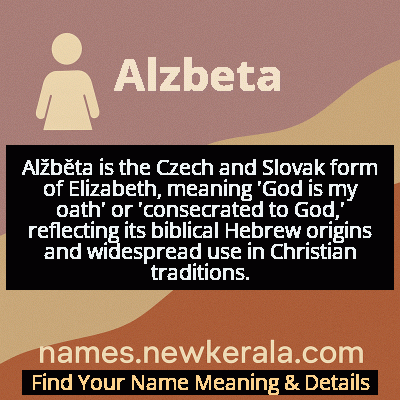Alzbeta Name Meaning & Details
Origin, Popularity, Numerology Analysis & Name Meaning of Alzbeta
Discover the origin, meaning, and cultural significance of the name ALZBETA. Delve into its historical roots and explore the lasting impact it has had on communities and traditions.
Name
Alzbeta
Gender
Female
Origin
Czechoslovakian
Lucky Number
4
Meaning of the Name - Alzbeta
Alžběta is the Czech and Slovak form of Elizabeth, meaning 'God is my oath' or 'consecrated to God,' reflecting its biblical Hebrew origins and widespread use in Christian traditions.
Alzbeta - Complete Numerology Analysis
Your Numerology Number
Based on Pythagorean Numerology System
Ruling Planet
Uranus (Rahu)
Positive Nature
Strong sense of order, loyal, practical, and disciplined.
Negative Traits
Stubborn, overly serious, rigid, and prone to feeling restricted.
Lucky Colours
Blue, gray.
Lucky Days
Saturday.
Lucky Stones
Blue sapphire.
Harmony Numbers
1, 7, 8.
Best Suited Professions
Managers, engineers, accountants, organizers.
What People Like About You
Dependability, discipline, practicality.
Famous People Named Alzbeta
Alžběta Pekařová
Czech actress
Prominent figure in Czech television and film industry
Alžběta Králová
Czech model
Miss Czech Republic 2012 and international modeling success
Alžběta Jirásková
Czech opera singer
Celebrated soprano at Prague's National Theatre
Name Variations & International Equivalents
Click on blue names to explore their detailed meanings. Gray names with will be available soon.
Cultural & Historical Significance
Extended Personality Analysis
Women bearing the name Alžbeta are typically associated with a distinctive blend of strength and grace that reflects the name's rich historical legacy. They often possess a natural authority combined with deep empathy, making them both respected leaders and compassionate friends. The spiritual meaning of 'consecrated to God' tends to manifest in strong moral principles and a sense of purpose that guides their life decisions. Alžbetas are frequently described as intellectually curious with a particular appreciation for history, arts, and cultural traditions. Their personality often includes a practical wisdom that enables them to navigate complex situations with both intelligence and emotional intelligence. Many demonstrate remarkable resilience, able to maintain their core values even when facing significant challenges. The melodic quality of the name suggests creative tendencies, and indeed many Alžbetas excel in artistic pursuits or careers that require both analytical thinking and creative problem-solving. They tend to be loyal partners and devoted family members, valuing deep connections and meaningful relationships above superficial social interactions. This combination of traditional values and modern capabilities makes Alžbetas particularly effective in roles that require bridging different perspectives or managing complex social dynamics.
Modern Usage & Popularity
In contemporary naming practices, Alžbeta occupies a unique position as a traditional name that maintains its cultural relevance while adapting to modern sensibilities. Current usage patterns show it being particularly favored by educated, middle-class families in both the Czech Republic and Slovakia who value cultural heritage but seek names with international recognition. While not among the most popular names statistically, it enjoys consistent usage as a sophisticated alternative to more common names. The digital age has actually helped preserve traditional names like Alžbeta, as parents can easily research name meanings and histories online. Modern Alžbetas often benefit from the name's distinctive quality in professional settings, where it stands out while remaining easily pronounceable internationally. The name has seen a modest revival among younger parents who appreciate its historical depth and elegant sound. Interestingly, the name maintains stronger popularity in urban centers than rural areas, suggesting its association with cultural sophistication and education. Contemporary usage also shows creative spelling variations emerging, though the traditional 'Alžbeta' remains the most respected form among naming traditionalists.
Symbolic & Spiritual Meanings
The name Alžbeta carries rich symbolic meanings that extend far beyond its literal translation. Most profoundly, it symbolizes the sacred covenant between the individual and divine purpose, representing a life dedicated to higher principles and moral integrity. The name serves as a metaphorical bridge between earthly existence and spiritual aspiration, embodying the human capacity for devotion and commitment. Culturally, Alžbeta represents the preservation of tradition in the face of modernization, symbolizing how meaningful customs can adapt while maintaining their essential character. The name also carries symbolic weight as a connector between generations, linking contemporary bearers to centuries of cultural history and family legacy. In a broader sense, Alžbeta symbolizes the enduring power of language to carry cultural memory and identity across time and political changes. The name's journey from ancient Hebrew through Greek, Latin, and into Slavic languages makes it a symbol of cultural synthesis and the shared human experience across civilizations. For modern bearers, the name often becomes a personal symbol of strength through tradition, elegance through simplicity, and identity through cultural continuity.

